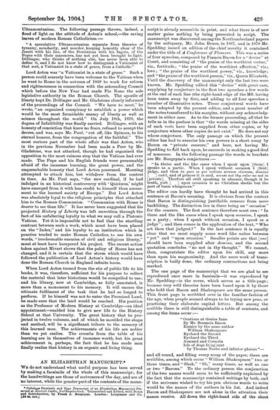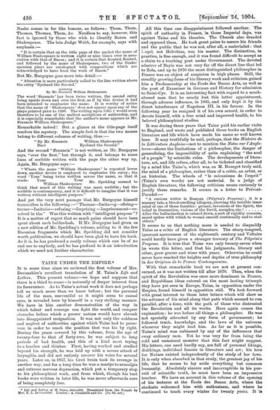AN ELIZABETHAN MANUSCRIPT.*
WE do not understand what useful purpose has been served by making a facsimile of the whole of this manuscript; for the handwritings are those of scriveners of the day, and are of no interest, while the greater part of the contents of the manu- script is already accessible in print, and what there is of new
matter gains nothing by being presented in script. The manuscript was discovered among the Northumberland papers by the antiquary, Mr. John Bruce, in 1867, and in 1870 Mr.
Spedding issued an edition of the chief novelty it contained under the title of A Conference of Pleasure. This was a series of four speeches, composed by Fnancis Bacon for a " device" at Court, and consisting of "the praise of the worthiest vertue,"
viz., fortitude ; "the praise of the worthiest affection," viz., love ; "the praise of the worthiest power," viz., knowledge; and "the praise of the worthiest person," viz., Queen Elizabeth. Until the discovery of the manuscript only the last two were known. Mr. Spedding edited this " device " with great care, supplying by conjecture in the first two speeches a few words at the end of each line (the right-hand edge of the MS. having
been eaten away by fire), and adding to all four speeches a number of illustrative notes. These conjectural words have been adopted by the present editor, and a great number of the notes transferred to his margins, without any acknowledg- ment in either case. As to the former proceeding, all that he tells us in the preface is that "the words missing at the sides of each recto have been supplied from other copies, or by
conjecture where other copies do not exist." He does not say whose conjecture. The only passage on which the present editor has had to exercise his own powers is a short essay by Bacon on "private censure," and here, not having Mr.
Spedding to fall back upon, he succeeds in making a good deal of nonsense. In the following passage the words in brackets are Mr. Burgoyne's conjectures :—
"In theise and the like cases when I speak upon [them] I speake as a partie. When I speak without occasion I [first] judge, and then tu quis es qui ituticas servum alienum, domino cad it, and of princes it is said, accute not thy ruler no not in [private]. Therfore all evill speaking in absence, though it be truth, yett [ ] upon occasion is no Christian duetie but the part of busie whisperers."
The editor can hardly have thought he had arrived in this sentence at Bacon's meaning. It is obvious from the context that Bacon is distinguishing justifiable censure from mere backbiting. The distinction lies in there being an "occasion" for the censure. The first sentence therefore must run : "In
these and the like cases when I speak upon occasion, I speak as a party ; when I speak without occasion, I speak as a judge "; and then comes in the application of the text, "Who art thou that judgest P" In the last sentence it is equally clear that we must supply some word like unless between "yet" and "upon occasion." Smaller points are that [suo] should have been supplied after domino, and the second
quotation concludes "no not in thy thought." We cannot, then, congratulate the editor upon his skill, any more than upon his magnanimity. And the mere work of trans- cription is badly done, the ordinary contractions not being marked.
The one page of the manuscript that we are glad to see reproduced once more in facsimile—it was reproduced by Mr. Spedding—is the cover, which serves as a title-page ; because very wild theories have been based upon it by those
who hold that Bacon and Shakespeare are the same person. This front page is scribbled over in the familiar fashion of the age, when people seemed always to be trying new pens, or practising their elaborate capital letters. But among the scribble there is still distinguishable a table of contents, and among the items occur :—
"Orations at Graies lane
By Mr. &guilds Bacon Essaies by the same author William Shakespeare Rychard the Second Rychard the Third Asmund and Cornelia Isle of dogs fr[ag]mnt
by Thomas Nashe and inferior plaiers "-
and all round, and filling every scrap of the paper, there are scribbles, among which occur "William Shakespeare" two or three times, and "Shah," " Sh," many times, as well as one or two "Bacons." To the ordinary person the conjunction of the two names would seem to be sufficiently explained by the fact that the manuscript contained writings by both, and if the scrivener wished to try his pen obvious words to write would be the names of the authors in his list. And indeed Bacon and Shakespeare are not alone in the attention their Nashe comes in for like honour, as follows : Thom, Thom, Thomas, Thomas, Thom, &c. Needless to say, however, this fact is ignored by those who wish to identify Bacon and Shakespeare. The late Judge Webb, for example, says with emphasis :—
"It is certain that on the title page of the packet the name of William Shakespeare is written eight or nine times over in asso- ciation with that of Bacon ; and it is certain that fronted, flanked, and followed by the name of Shakespeare, two of the Shake- spearian plays are catalogued with compositions which are acknowledged to have been the work of Bacon."
But Mr. Burgoyne goes more into detail :— " Attention is more particularly called to the line written above the entry Rychard the Second.'
spimmg By Mr. ffrauncis William Shakespeare.
The word ffrauncis' has been twice written, the second entry being upside down and over the first, as if by this device it had been intended to emphasise the name. It is worthy of notice that the name of 'Shakespeare' does not appear upon any of the plays printed prior to 1698. The writing upon folio 1 would seem therefore to be one of the earliest ascriptions of authorship, and it is especially remarkable that the author's name appears as Mr. ffrauncis William Shakespeare."
Remarkable indeed ! But a glance at the title-page itself resolves the mystery. The simple fact is that the two names belong to different columns of writing, thus :— "By Mr. ffrauncis William Shakespeare Baca Rychard the Second."
And the second " ffrauncis" is not written, as Mr. Burgoyne says, "over the first," but through it, and belongs to some lines of scribble written with the page the other way up.
Again, Mr. Burgoyne says :—
"Where the name 'William Shakespeare' is repeated lower down, another device is employed to emphasise the entry ; the word 'Your' being twice written across the name, so that it
reads : Your Your Mr. Spedding seemed to William Shakespeare think that much of this writing was mere scribble ; but the scribble is contemporary, and it is difficult to imagine that it was written without intelligent purpose."
And yet the very next passage that Mr. Burgoyne himself transcribes is the following :—" Thomas—Imita.—g—ofising- turner—Imitatio-- refusing —Imprising —Imprisonment—re- solved in the." Was this written with "intelligent purpose " ? It is a matter of regret that so much pains should have been spent about such balderdash. If Mr. Burgoyne had given us a new edition of Mr. Spedding's volume, adding to it the few Baconian fragments which Mr. Spedding did not consider worth publication, we should have been glad to have his book. As it is, he has produced a costly volume which can be of no real use to anybody, and he has prefixed to it an introduction which we need not further characterise.







































 Previous page
Previous page